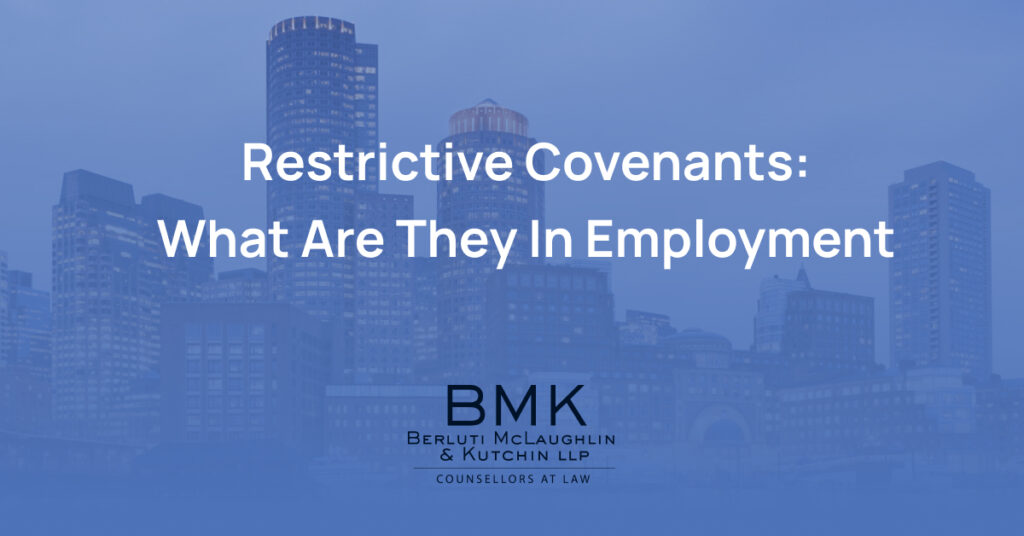
Massachusetts’ fast-paced and competitive business landscape makes it crucial for companies to protect their interests. For this reason, many employers include restrictive covenants in employment contracts, particularly for executives and highly compensated employees. But what are restrictive covenants in employment, and how do they impact businesses and employees?
In short, restrictive covenants are agreements that limit specific employee actions during or after their tenure with a company.
They protect an employer’s legitimate business interests but can also affect an employee’s prospects, raising questions about fairness and enforceability, especially for employees who may feel limited by them. In this article, we’ll explain restrictive covenants in employment contracts in Massachusetts and why they matter for both sides.
What Are Restrictive Covenants in Employment?
Restrictive covenants in employment contracts place restrictions on employees during and after employment. Companies craft these restrictions to protect a business’s valuable information—including business relationships, intellectual property, client relationships, trade secrets, confidential information, and strategic plans—and client base from being leveraged by former employees, especially when they join competitors.
Restrictive covenants are a crucial business safeguard, particularly for executive-level employees or those with access to sensitive company information. Solid restrictive covenants strive to balance business protections with an employee’s right to work freely.
How Can BMK Help with Restrictive Covenants?
At BMK, we understand that modern business practices demand restrictive covenants, and we view them as a strategic partnership tool that sets clear expectations, protecting an employer’s and employee’s mutual interests.
We also understand that navigating a restrictive covenant’s intricacies can be challenging, especially for elaborate businesses and executive-level employees. Our skilled attorneys help clients understand these agreements and negotiate terms that balance both parties’ interests.
We pride ourselves on delivering professionalism, technical knowledge, and personalized attention. We aim to provide exceptional legal services at a reasonable price, offering employers and employees exemplary client services and high-quality representation without the hefty fees associated with larger firms.
Whether you’re an employer who needs help creating enforceable restrictive covenants or an employee worried about how these clauses might affect your future job opportunities, we can guide you through Massachusetts employment law to achieve the best outcome.
What Are the Types of Restrictive Covenants in Employment Contracts?
Restrictive covenants in employment contracts come in different forms, each serving a distinct protective purpose for the employer. Below are some of the most common restrictive covenants in employment contracts.
Non-Compete Agreements
Non-compete agreements prevent employees from working for a competitor or starting a competing business within a specified timeframe and geographic area after leaving the company. Massachusetts law strictly regulates these agreements, ensuring they meet specific criteria, such as a reasonable duration and geographic scope. Advanced employee positions that breed substantial competition risks often come with these contractual covenants.
Non-Solicitation Agreements
Non-solicitation clauses prevent former employees from soliciting clients, vendors, or employees from the employee’s previous place of employment. Business owners benefit from these agreements by retaining their clientele and employees without being concerned about ex-employees poaching their talent.
Confidentiality Agreements
Also called non-disclosure agreements (NDAs), confidentiality agreements protect trade secrets and proprietary information. Unlike other restrictive covenants, confidentiality agreements are often indefinite, as they protect sensitive information rather than limit an employee’s future career moves. They also protect a business from unfair competition if employees use their insider knowledge to undermine their former employer.
What Is a Restrictive Covenants’ Employment Meaning?
The restrictive covenants’ employment meaning lies in their ability to protect the interests of both parties when implemented correctly. Restrictive covenants can benefit employers and employees by establishing clear boundaries and expectations.
For employers, restrictive covenants allow businesses to shield their proprietary interests and maintain a strategic competitive edge. They enable companies to invest in talent without fearing competitors will poach sensitive information.
However, for executive-level employees, restrictive covenants can be a double-edged sword. Despite a well-structured contract, high-level employees often face strict clauses that limit future career prospects.
Overall, restrictive covenants should strike a balance. A company’s policies should not be overly restrictive or impede employees’ ability to find work in their respective fields. Massachusetts courts are particularly mindful of this balance and will enforce restrictive covenants only if they are reasonable and necessary to protect a legitimate business interest. Employees who understand these covenants can make informed career choices and negotiate fair terms that respect their long-term career goals.
Partner with BMK—Your Trusted Employment Advisors
At BMK, we anticipate potential challenges before they arise. We don’t just address your current legal problems. We’ll help you plan for them, ensuring you’re prepared for any bumps in the road.
Ranked “Best Law Firm’s” Best Lawyers in 2024 and among Best Lawyers in America and Boston’s Top Rated AV Preeminent attorneys, our team provides award-winning experience, personalized attention, and proactive solutions tailored to businesses and their employees’ unique needs. With accolades like the Martindale-Hubbell “AV” rating and a spot in TopVerdict.com’s Top 100 for labor and employment law, you can trust BMK to exceed your expectations.
Contact us today to experience unparalleled client service and legal excellence—our skilled attorneys are happy to explain how we can help you.

